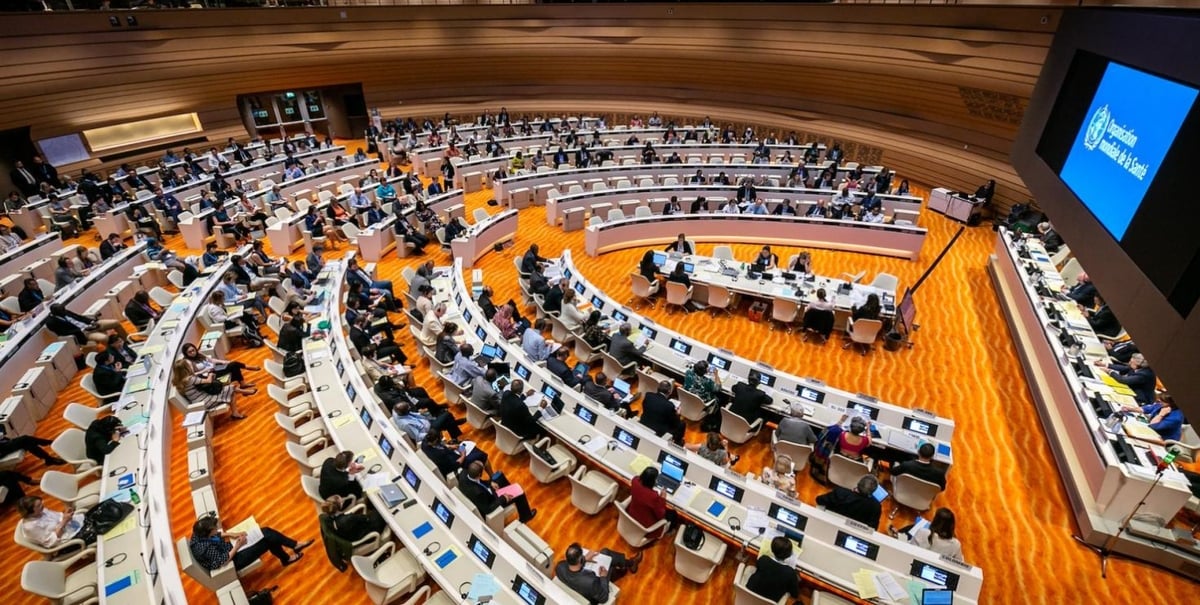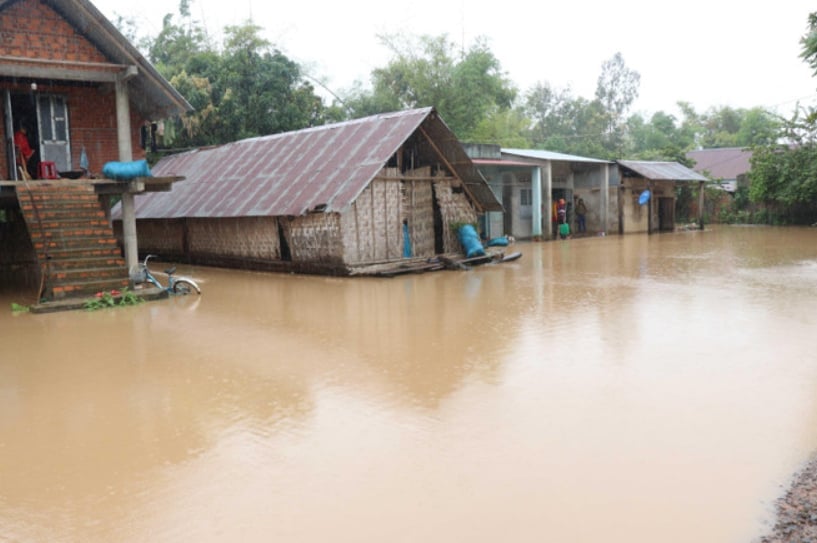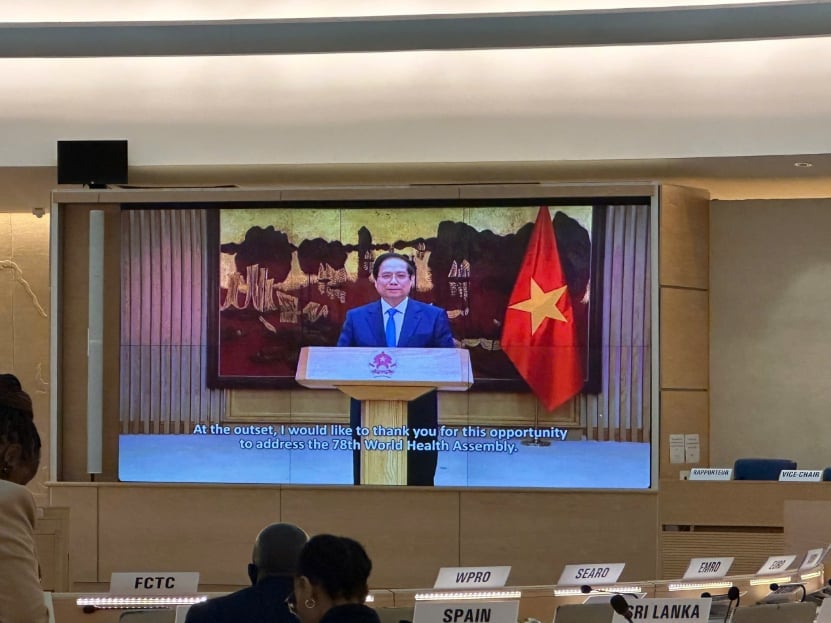December 20, 2025 | 12:13 GMT +7
December 20, 2025 | 12:13 GMT +7
Hotline: 0913.378.918
December 20, 2025 | 12:13 GMT +7
Hotline: 0913.378.918
From May 19 to 27, 2025, the 78th World Health Assembly (WHA78) took place in Geneva, Switzerland. With the theme “One World for Health”, this year’s assembly carried a sense of both urgency and hope, as for the first time, the connection between climate change and public health was addressed in such a clear and systematic manner. According to the WHO, health is no longer solely a concern of the medical sector, but has become a central element in global climate policy.

The 78th World Health Assembly is held under the theme 'One World for Health'. Photo: UN Geneva.
The event brought together over 190 member states, along with non-governmental organizations, private sector representatives, and the scientific community, forming a multidimensional picture of a shared concern for humanity. Within the framework of the Assembly, the WHO introduced the Draft Global Action Plan on Climate Change and Health. This document not only encourages countries to integrate health considerations into their Nationally Determined Contributions (NDCs) under the Paris Agreement, but also promotes the development of climate-resilient health systems, early warning networks, and the upgrading of health infrastructure toward sustainability.
Another highlight of the Assembly was a strong call for inclusive participation in climate–health policymaking and implementation, to ensure broad social consensus. However, according to the Climate and Health Alliance (2025), the draft still leaves major gaps. Most notably, there is no reference to the severe impacts of fossil fuels, the primary source of air pollution and greenhouse gas emissions. Health experts within and beyond the alliance have spoken out, arguing that to protect public health truly, the WHO and nations must boldly place the reduction of fossil fuel dependence on the global policy agenda.
Viet Nam is not standing on the sidelines of this discussion. According to the Global Climate Risk Index (Germanwatch, 2020), Viet Nam ranked 6th among the countries most severely affected by climate change from 1999 to 2018. These numbers are no longer just statistics. In everyday life, residents of Ho Chi Minh City and Hanoi are already experiencing the impacts firsthand: on many days throughout the year, the Air Quality Index (AQI) exceeds hazardous levels, seriously affecting the health of children, the elderly, and people with chronic illnesses (according to WHO Viet Nam, 2024).

Storm No. 6 causes flooding in Dak Lak. Photo: Tuan Anh/VNA.
According to the report "Impacts of saline intrusion during the dry season in the Mekong Delta" by the Institute for Environment and Resources (2023), the Mekong Delta experienced concerning figures in the 2023 dry season: over 21% of the population showed symptoms of skin and digestive diseases caused by saline-contaminated water. Meanwhile, the Central region recorded a 38% increase in hospital admissions due to heat stroke compared to the previous period (according to the Climate Impact Report on Provincial Hospitals by the Ministry of Health, 2024).
These challenges are not only obstacles but also open opportunities for innovation. According to UNDP (2025), Viet Nam is currently one of the few Southeast Asian countries eligible to access up to 200 million USD in funding from the Green Climate Fund (GCF). If used effectively, this investment could serve as a lever to upgrade hospitals, build disease surveillance systems linked with climate data, and support vulnerable communities, from coastal areas to mountainous regions.
Another bright spot is the pilot program in Hue, where an early warning system for dengue fever is being tested by combining artificial intelligence (AI) with meteorological data. Although still in its early stages, this model is expected to become a benchmark for applying technology in climate-related health care in Viet Nam.
Looking back at the discussions and commitments made at WHA78, it is clear that health is gradually becoming the intersection between environmental policy and sustainable development. Integrating health into climate policy is no longer an option but has become an essential part of national development strategies.
In the Draft Global Action Plan on Climate Change and Health presented by WHO at WHA78, the organization expects countries, including Viet Nam, to translate these commitments into practical actions. This could involve increasing investment in climate-resilient healthcare, promoting cross-sector collaboration, or developing healthcare models capable of withstanding extreme weather risks.
For Viet Nam, this commitment was clearly demonstrated when Prime Minister Pham Minh Chinh sent a message to WHA78, emphasizing the importance of human health in all development policies and calling for international cooperation to address global challenges such as climate change.

A video message from Prime Minister Phạm Minh Chính was broadcast during the Plenary Session of the Assembly on May 20, 2025. Photo: Reporting delegation from Geneva, Switzerland (Ministry of Health).
According to an announcement by the Vietnamese Ministry of Health and the World Health Organization (WHO) on November 17, 2023, Viet Nam has joined the Action Transformation Alliance on Climate and Health (ATACH), initiated by WHO, aiming to support the national health system in achieving net-zero emissions by 2050.
Perhaps the most valuable lesson comes from the COVID-19 pandemic itself: only health systems that are flexible and resilient enough can withstand global shocks. Climate change, with all its consequences, is the next test we cannot afford to ignore.
Translated by Phuong Linh

(VAN) Risk assessment in food safety management not only helps protect public health but also promotes sustainable development.

(VAN) Prime Minister chaired the 26th meeting of the National Steering Committee on Illegal, Unreported, and Unregulated (IUU) Fishing.

(VAN) Cuba is currently streamlining procedures to attract investors, with many new policies shaped by the practical experiences of Vietnamese projects operating in the country.

(VAN) Patrol Team No. 15 has been executing patrol, inspection, and control duties in the Southwest waters, a region identified as having a high risk of violations.

(VAN) UNICEF, IOM, and the U.S. Department of State have worked together to ensure the justice system becomes a protective shield for children and other vulnerable groups.

(VAN) As a key driving force of green transition, the circular economy is being identified as a strategic pillar of Viet Nam's new growth model.

(VAN) UNICEF and IOM receive this aid and provide essential services to assist families affected by recent storms and floods.